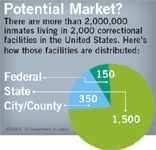Doctors Behind Bars
Pharmaceutical Executive
There's no better use of healthcare marketing dollars than to reach patients with unmet needs. That's why niche marketing has gained steam during the last few years. But increasing competition in accessing doctors who treat culturally and racially diverse patient groups means pharma marketers have to refine their definition of what constitutes a niche market in the first place. In doing so, they may stumble over a market that has not yet been saturated—US prisoners.
There's no better use of healthcare marketing dollars than to reach patients with unmet needs. That's why niche marketing has gained steam during the last few years. But increasing competition in accessing doctors who treat culturally and racially diverse patient groups means pharma marketers have to refine their definition of what constitutes a niche market in the first place. In doing so, they may stumble over a market that has not yet been saturated—US prisoners.
Market report. More than two million adults are incarcerated in the US, spread among federal, state, and juvenile facilities. (See "Potential Market?") They are more likely than the general population to have conditions such as HIV, hepatitis C, and psychotic disorders. In fact, they are three to four times more likely to suffer from serious mental illness, according to the US Department of Corrections.

Potential Market
Physicians working in prisons are often not prison employees, according to Dilip Phadnis, chief executive of the Rowin Group, which is undertaking a study on prison drug use. He says institutions often outsource clinical services to companies such as Prison Health Services, which serves more than 300 correctional facilities in the United States.
Phadnis notes that prisons use a national formulary and three prescription benefit managers (Correctional Medical Systems, Secure Pharma Plus, a sister company to Prison Health Service, and Diamond Drugs) cover nearly 700,000 prison lives.
Building momentum. More companies are making inroads into marketing to stakeholders who influence what drugs are used in jail. For example, Pfizer included this market when it launched its anti-psychotic Geodon (ziprasidone) in 2001. And the National Council on Correctional Health Care already reports many Big Pharma exhibitors—such as Abbott, AstraZeneca, Boehringer-Ingelheim, Janssen, and Roche—for its annual meeting at which 2,000 correctional health professionals are expected to gather in November.
Moving forward. Prisons spend nearly $6 billion on healthcare each year, according to the Rowin Group, so opportunity abounds. So do questions—like the rules governing the detailing of prison doctors. But careful market research, thoughtful education, and communication with all stakeholders paves the way to make the most of this growing opportunity.
Addressing Disparities in Psoriasis Trials: Takeda's Strategies for Inclusivity in Clinical Research
April 14th 2025LaShell Robinson, Head of Global Feasibility and Trial Equity at Takeda, speaks about the company's strategies to engage patients in underrepresented populations in its phase III psoriasis trials.
Beyond the Prescription: Pharma's Role in Digital Health Conversations
April 1st 2025Join us for an insightful conversation with Jennifer Harakal, Head of Regulatory Affairs at Canopy Life Sciences, as we unpack the evolving intersection of social media and healthcare decisions. Discover how pharmaceutical companies can navigate regulatory challenges while meaningfully engaging with consumers in digital spaces. Jennifer shares expert strategies for responsible marketing, working with influencers, and creating educational content that bridges the gap between patients and healthcare providers. A must-listen for pharma marketers looking to build trust and compliance in today's social media landscape.
Pfizer, GSK Gain ACIP Recommendations for RSV and Meningococcal Vaccines
April 18th 2025The Centers for Disease Control and Prevention’s Advisory Committee on Immunization Practices voted to expand access to Pfizer’s respiratory syncytial virus vaccine Abrysvo for high-risk adults in their 50s and voted in favor of GSK’s meningococcal vaccine, Penmenvy, for streamlined adolescent protection.
